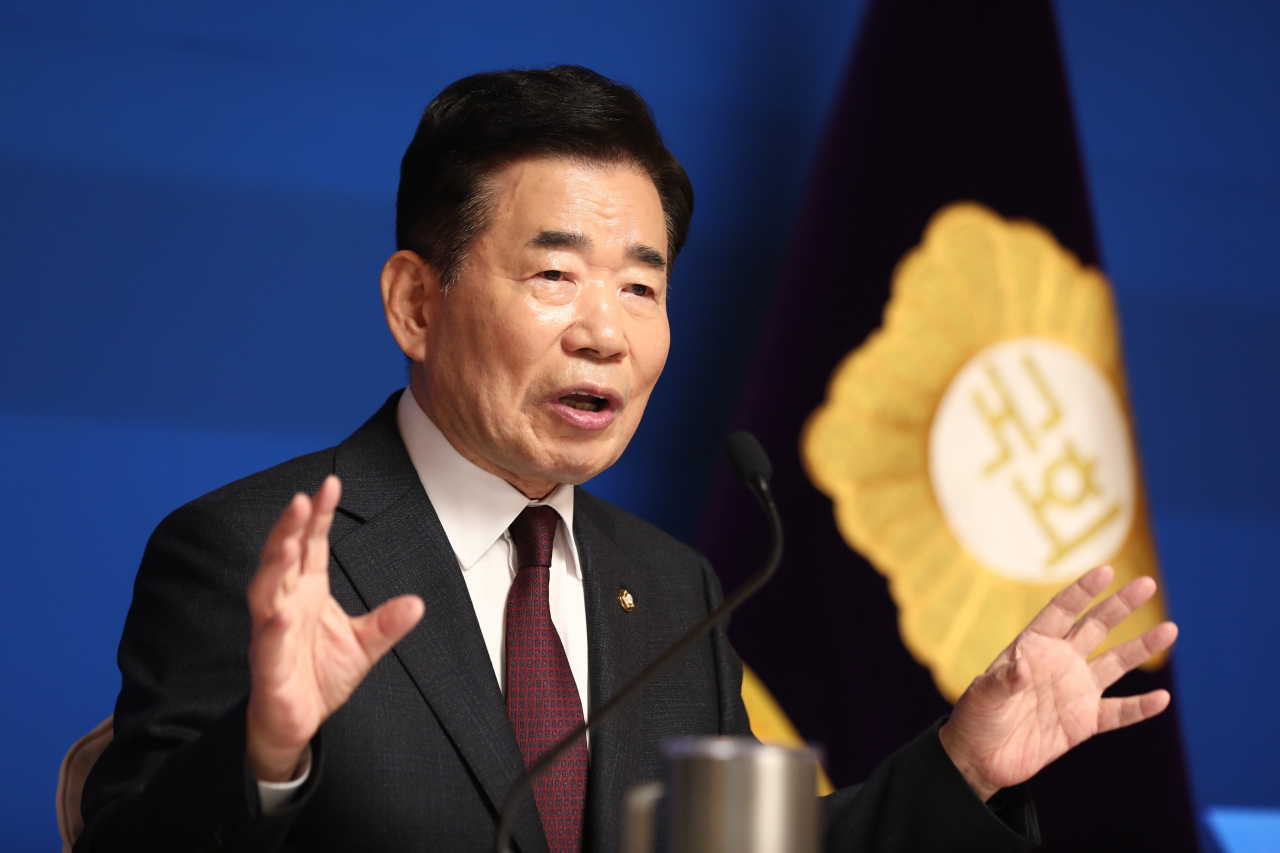Birth rate-boosting bills should be passed: Assembly Speaker
'Korea needs to update its perspective on immigration,’ says Kim Jin-pyo
By Jung Min-kyungPublished : Jan. 4, 2024 - 14:24

South Korea’s National Assembly speaker on Thursday called for solutions to the nation’s low birth rate and declining population to be legislated, highlighting the need for more long-term policies.
“The government and the political circles should see the ongoing population decline as a serious national crisis,” Kim Jin-pyo said in a New Year’s briefing held at the National Assembly.
“The issue should be dealt with as a long-term agenda and solutions tied to child care, education and housing should be legislated. It should be prioritized in this year’s legislative reform,” he added.
So far, Korea has failed to maintain any long-term policy on improving its birth rate and shrinking population.
“One of the biggest reasons behind the failure to improve our birth rate is that every time a new administration comes into power, it fails to continue or build on its previous administration’s policy,” Kim explained.
“The five-year presidency term (is too short for an administration’s policy to bear fruit).”
A total of 380 trillion won ($289.8 billion) has been funneled into policies aimed at resolving the nation’s birth rate crisis since 2006, but the total fertility rate has only continued to drop, Kim noted. It dropped to 0.72 as of the end of 2023, down from 1.13 as of the end of 2006, data from Statistics Korea showed.
The legislation of such policies would give parents “hope” that child care benefits will continue to exist long-term, according to Kim.
On education issues, Kim said that officials must come up with ideas to lessen the reliance of parents and the students on private education.
“It is meaningless to come up with any other solutions to the low birth rate if we choose to ignore the nation’s excessive spending on private education,” he noted.
Koreans spent a record high of 26 trillion won on private education in 2022, according to the latest government data.
The state-affiliated Korea Research Institute for Human Settlements picked the nation’s surging housing prices and increasing spending on private education as two major reasons behind its declining birth rate, in its report released Wednesday.
“Efforts to reform the nation’s public education system must come this year,” Kim said.
Kim mentioned the need to adopt fresh perspectives on immigration and the issues of granting dual and multiple citizenship to improve its population decline.
By law, Koreans are only allowed to hold dual or multiple citizenship on limited conditions. The details vary per country and applicant, but only those born after June 14, 1998 are allowed to acquire dual citizenship in Korea and the US if either of the applicant’s parents is of Korean nationality. Dual citizenship is also not allowed for overseas Koreans except for those who are aged 65 or older. The law often pushes the applicants to choose the other nationality over Korean citizenship.
Meanwhile, the Justice Ministry is currently gearing up to launch an immigration agency.
“We need to change our perspective on immigrants and Koreans living overseas and bring about a change to the existing system," the assembly speaker said.
"Long-standing issues on allowing overseas Koreans to acquire dual citizenship, establishing the immigration agency and attracting more immigrants should be resolved at a faster pace.”
Korea’s total birth and fertility rates fell to record lows in 2022, government data showed. Only 249,000 babies were born that year, marking the first time the figure had fallen below the 250,000-mark since the government started compiling relevant data in 1970.
The fertility rate, the average number of children a woman bears in her lifetime, hit a fresh low of 0.78 in the same period.



















